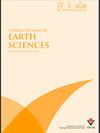Neotectonic and topographic evolution of the Bitlis-Zagros Fold-Thrust Belt, SE Turkey
IF 1.1
4区 地球科学
Q3 GEOSCIENCES, MULTIDISCIPLINARY
引用次数: 0
Abstract
: The Bitlis-Zagros Fold-Thrust Belt is one of the world’s largest deformation zones, extending from the Eastern Mediterranean in southern Turkey to in the south of Iran. This deformation zone is partitioned between different structures; however, little is known about the relative activities of these different structures and their effects on topography. An area located in the northern part of Bitlis-Zagros Fold-Thrust Belt, just south of the Eastern Anatolian Plateau was studied in detail to analyze the effect of active tectonism on topographic development. The effects of active deformation structures such as Hakkâri and Şirvan Fault Segments on the topographic evolution of Kato Folds and Sinebel Valley were investigated to understand the fold and thrust fault activity. Geomorphic indices were used, such as HC, HI, SR, Ksn together with rose analysis based on bedding measurements. Investigation of folding in the region indicates the effective stress regime in the precollision zone was in NW-SE compression direction. The deformation structures, effective in the postcollision zone developed due to N-S directional compression, and are shown here to have different effects on topography of the region. This study has shown the relative uplift rate is highest in the areas where Hakkâri and Şirvan Segments are pure thrust faults (0.4 mm year –1 ), and lower in the transfer zone (0.2 to 0.4 mm year –1 ) between the segments. As a result of this study, it is concluded that the main deformation structures controlling the topography in the region are not only thrust faults, but also structures that develop in the area of transfer zone.土耳其东南部Bitlis-Zagros褶皱冲断带新构造与地形演化
:Bitlis Zagros褶皱冲断带是世界上最大的变形带之一,从土耳其南部的东地中海延伸到伊朗南部。该变形区在不同的结构之间划分;然而,人们对这些不同结构的相对活动及其对地形的影响知之甚少。详细研究了位于东部安纳托利亚高原以南的Bitlis Zagros褶皱冲断带北部的一个地区,以分析活跃的构造作用对地形发展的影响。研究了Hakkâri和Şirvan断层段等活动变形结构对加藤褶皱和Sinebel山谷地形演变的影响,以了解褶皱和逆冲断层活动。使用了地貌指数,如HC、HI、SR、Ksn,以及基于层理测量的玫瑰分析。对该区域褶皱的研究表明,预碰撞区的有效应力状态为NW-SE压缩方向。在由于N-S方向压缩而形成的碰撞后区,变形结构是有效的,并且在这里显示出对该区域的地形有不同的影响。这项研究表明,在Hakkâri和Şirvan段为纯逆冲断层的地区,相对抬升率最高(0.4毫米年-1),而在两段之间的转换带,相对抬升速率较低(0.2至0.4毫米年-1)。研究结果表明,控制该地区地形的主要变形构造不仅是逆冲断层,而且是在转换带区域发育的构造。
本文章由计算机程序翻译,如有差异,请以英文原文为准。
求助全文
约1分钟内获得全文
求助全文
来源期刊

Turkish Journal of Earth Sciences
地学-地球科学综合
CiteScore
2.40
自引率
10.00%
发文量
6
审稿时长
6 months
期刊介绍:
The Turkish Journal of Earth Sciences is published electronically 6 times a year by the Scientific and Technological Research
Council of Turkey (TÜBİTAK). It is an international English-language journal for the publication of significant original recent
research in a wide spectrum of topics in the earth sciences, such as geology, structural geology, tectonics, sedimentology,
geochemistry, geochronology, paleontology, igneous and metamorphic petrology, mineralogy, biostratigraphy, geophysics,
geomorphology, paleoecology and oceanography, and mineral deposits. Contribution is open to researchers of all nationalities.
 求助内容:
求助内容: 应助结果提醒方式:
应助结果提醒方式:


